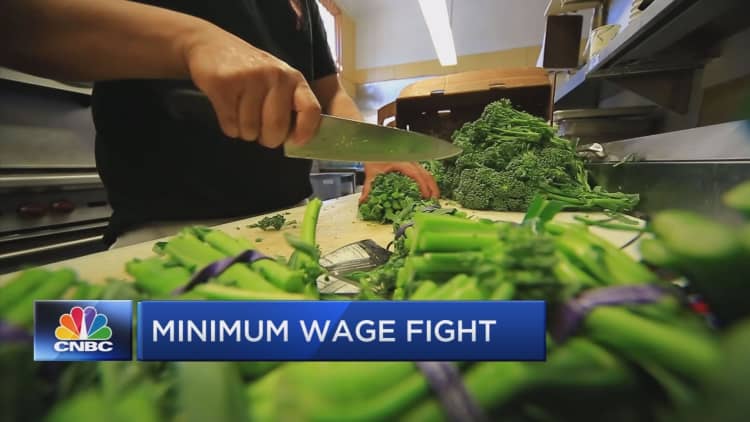Workers in four states may be getting a raise post-Election Day, with initiatives to raise the minimum wage heading to a vote. Arizona, Colorado and Maine all have ballot measures to hike local wages to $12 an hour, while Washington State voters will consider $13.80 an hour. All increases are to be phased in gradually by the year 2020.
The pendulum seems to be swinging in favor of higher wages nationally, where 29 states and Washington, D.C., now have minimum wages above the federal level of $7.25 an hour. The federal minimum wage has been stagnant since 2009, but the Obama Administration has taken steps to offer workers better protections during that time period; the Department of Labor, for example, enacted sweeping changes on overtime regulations. In less than a month, on December 1, more than four million salaried employees earning $23,660 to $47,476 each year will be eligible for overtime pay.
While economists continue to debate whether or not higher pay is good for business, employers like Wal-mart, Target, and Facebook have offered higher pay to workers in recent years. And both presidential candidates agree that a raise of the minimum wage is in order: Republican nominee Donald Trump has proposed $10 an hour, while Democratic nominee Hillary Clinton supports a wage of $12 an hour, and $15 an hour in cities and municipalities where that is economically feasible.
Since 2000, every ballot initiative that's been put in front of voters to increase the minimum wage has succeeded.Laura Huizarstaff attorney for the National Employment Law Project
Wage advocates like Laura Huizar, staff attorney for the New York City-based nonprofit National Employment Law Project, hope to see all four state ballot initiatives pass next week.
"State and local action is putting more pressure on the federal government. The growing support for higher wages across the country is showing that you can increase wages and improve communities, improve conditions for families and workers .... There's a strong message that Congress should do something," Huizar says. "In recent years, since 2000, every ballot initiative that's been put in front of voters to increase the minimum wage has succeeded."
If you are going to occupy someone's time for 40 hours a week, you ought to provide them with a wage that is sufficient for them to at least get byJudy Amabileowner of Product Architects, Inc.
In Boulder, Colorado, Judy Amabile, owner of Product Architects, Inc., said she's supporting the ballot initiative to hike wages to$12 an hour by 2020 from the state's current rate of $8.31. Although she already pays workers above the minimum, starting at $12 an hour, Amabile says it's simply the right thing to do.
"We see that as a fundamental fairness issue," she says. "If you are going to occupy someone's time for 40 hours a week, you ought to provide them with a wage that is sufficient for them to at least get by, put a roof over their head and put food on their table."
When she began paying her entry level workers more several years ago, Amabile expected labor costs to increase at the business, which manufactures water bottles. But costs per worker went down, while retention went up. People were working harder and calling out sick less.
But not everyone on Main Street is behind the push for higher wages. The National Federation of Independent Business, a conservative lobbying group based in Washington, D.C., recently saw its uncertainty index hit at 42-year high for small businesses, the owners of which are increasingly concerned about issues like higher pay.
"[Small business owners] are very worried about hikes in the minimum wage, rising health-care costs under Obamacare. They can't raise prices, so they won't be able to absorb higher labor costs," says Juanita Duggan, President and CEO of the NFIB.
Huizar disagrees, noting that more money for workers can lead to an economic boost, which benefits Main Street.
"Businesses know firsthand that more money in the pockets of workers will mean more money for those workers to spend at local businesses," she says.



